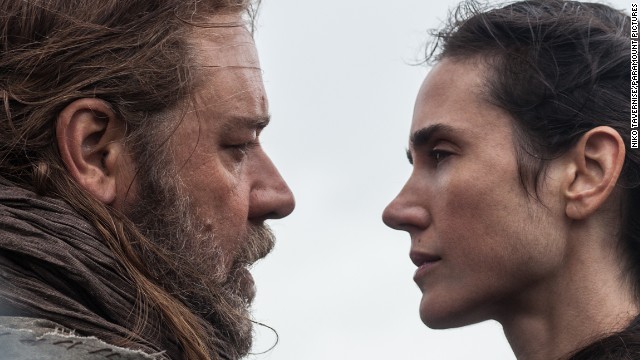 2014 promises a number of epic tales from the Bible, the latest being "Noah," starring Russell Crowe and Jennifer Connelly (out March 28). But not everyone is happy with the depictions in faith-based films. While "Noah" makes clear it's merely "inspired by" the Biblical story, that hasn't stopped the outpouring of concern and anger from those sensitive to the source material. Even before "Noah" hit theaters, it was banned in several Middle Eastern countries for contradicting the teachings of Islam with its portrayal of a prophet. See the films, past and present, that brought the Bible to the box office with a bang.
2014 promises a number of epic tales from the Bible, the latest being "Noah," starring Russell Crowe and Jennifer Connelly (out March 28). But not everyone is happy with the depictions in faith-based films. While "Noah" makes clear it's merely "inspired by" the Biblical story, that hasn't stopped the outpouring of concern and anger from those sensitive to the source material. Even before "Noah" hit theaters, it was banned in several Middle Eastern countries for contradicting the teachings of Islam with its portrayal of a prophet. See the films, past and present, that brought the Bible to the box office with a bang. 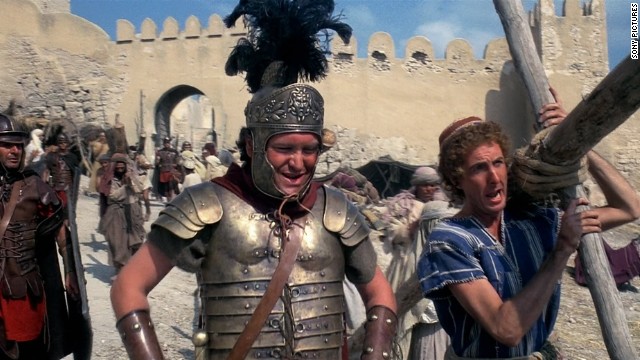 Monty Python's "Life of Brian" (1979): This British satire has become a staple of the Monty Python canon. The film drew accusations of blasphemy and protests from religious groups upon its release. It was banned from some parts of the United Kingdom, and some countries entirely, for decades. In typical Monty Python fashion, the filmmakers used the negative attention to assist their marketing campaign. It must have helped, as "'Life of Brian" became a box office success.
Monty Python's "Life of Brian" (1979): This British satire has become a staple of the Monty Python canon. The film drew accusations of blasphemy and protests from religious groups upon its release. It was banned from some parts of the United Kingdom, and some countries entirely, for decades. In typical Monty Python fashion, the filmmakers used the negative attention to assist their marketing campaign. It must have helped, as "'Life of Brian" became a box office success.  "The Passion of the Christ" (2004): The Mel Gibson-directed drama caused a box office firestorm when it hit theaters. The film depicts the last 12 hours of Jesus' life and draws on various accounts to do so. The financial success drew criticism for its gruesome violence as well as from Catholic Church groups over the authenticity of the non-biblical material it drew upon. Some upset parties felt that Gibson deliberately departed from biblical accounts of Christ's crucifixion.
"The Passion of the Christ" (2004): The Mel Gibson-directed drama caused a box office firestorm when it hit theaters. The film depicts the last 12 hours of Jesus' life and draws on various accounts to do so. The financial success drew criticism for its gruesome violence as well as from Catholic Church groups over the authenticity of the non-biblical material it drew upon. Some upset parties felt that Gibson deliberately departed from biblical accounts of Christ's crucifixion. 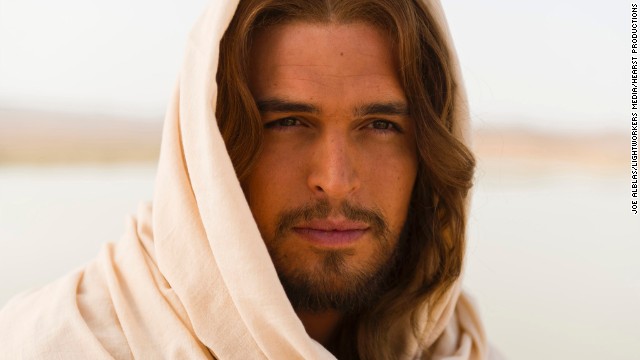 "Son of God" (2014): The continuation of "The Bible" miniseries became a box office success this year, but not without getting audiences hot and bothered. The film cut out scenes featuring the character of Satan in response to negative buzz surrounding the actor's striking resemblance to President Barack Obama. Also, many were worked up about the attractive actor portraying Jesus. Some viewers weren't ready for #HotJesus.
"Son of God" (2014): The continuation of "The Bible" miniseries became a box office success this year, but not without getting audiences hot and bothered. The film cut out scenes featuring the character of Satan in response to negative buzz surrounding the actor's striking resemblance to President Barack Obama. Also, many were worked up about the attractive actor portraying Jesus. Some viewers weren't ready for #HotJesus. 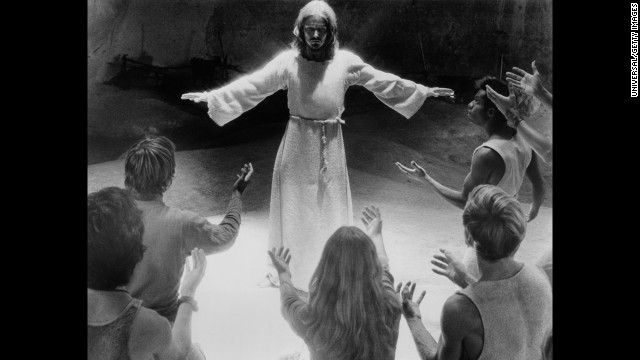 "Jesus Christ Superstar" (1973): Based on the Andrew Lloyd Webber and Tim Rice opera of the same name, the film adaptation starring Ted Neeley hit theaters amid a flurry of criticism. Jewish groups called it anti-Semitic for its emphasis on the role of the Jews in the death of Jesus. Some Catholics and Protestants felt the story was blasphemous for portraying Jesus as being even remotely interested in sex.
"Jesus Christ Superstar" (1973): Based on the Andrew Lloyd Webber and Tim Rice opera of the same name, the film adaptation starring Ted Neeley hit theaters amid a flurry of criticism. Jewish groups called it anti-Semitic for its emphasis on the role of the Jews in the death of Jesus. Some Catholics and Protestants felt the story was blasphemous for portraying Jesus as being even remotely interested in sex.  "The Nativity Story" (2006): Mary, the teen mom? "Twilight" director Catherine Hardwicke took a shot at retelling the birth of Jesus in this film, starring Keisha Castle-Hughes. Hughes received an Oscar nomination for her debut role in 2002's "Whale Rider" and seemed like a perfect fit as the Virgin Mary. But the film hit a public snag when it was revealed that the then-16-year-old became pregnant out of wedlock.
"The Nativity Story" (2006): Mary, the teen mom? "Twilight" director Catherine Hardwicke took a shot at retelling the birth of Jesus in this film, starring Keisha Castle-Hughes. Hughes received an Oscar nomination for her debut role in 2002's "Whale Rider" and seemed like a perfect fit as the Virgin Mary. But the film hit a public snag when it was revealed that the then-16-year-old became pregnant out of wedlock.  "The Robe" (1953): Richard Burton stars in this drama, which won two Oscars and became the only biblical epic with a sequel. Best known as the first film released in the widescreen process CinemaScope, the tale of a fictional Roman tribune who commands the unit that crucifies Jesus is filled with just that: fiction. Despite being rooted in the Bible, the story itself is original and includes a number of historical inaccuracies.
"The Robe" (1953): Richard Burton stars in this drama, which won two Oscars and became the only biblical epic with a sequel. Best known as the first film released in the widescreen process CinemaScope, the tale of a fictional Roman tribune who commands the unit that crucifies Jesus is filled with just that: fiction. Despite being rooted in the Bible, the story itself is original and includes a number of historical inaccuracies. 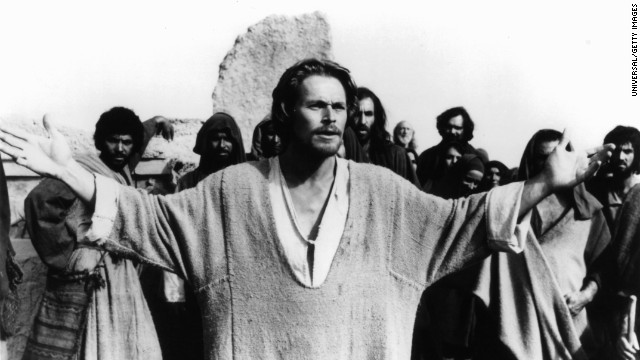 "The Last Temptation of Christ" (1988): Martin Scorsese's adaptation of Nikos Kazantzakis' 1953 novel ruffled feathers upon its release, to say the least. The film, starring Willem Dafoe, includes a disclaimer explaining that it is not based on the biblical gospels and veers far from the biblical portrayal of Jesus' life. Several Christian fundamentalist groups organized protests and boycotts of the film, convincing some movie chains not to show the film. Multiple countries banned the film at the time, and a few still do.
"The Last Temptation of Christ" (1988): Martin Scorsese's adaptation of Nikos Kazantzakis' 1953 novel ruffled feathers upon its release, to say the least. The film, starring Willem Dafoe, includes a disclaimer explaining that it is not based on the biblical gospels and veers far from the biblical portrayal of Jesus' life. Several Christian fundamentalist groups organized protests and boycotts of the film, convincing some movie chains not to show the film. Multiple countries banned the film at the time, and a few still do. 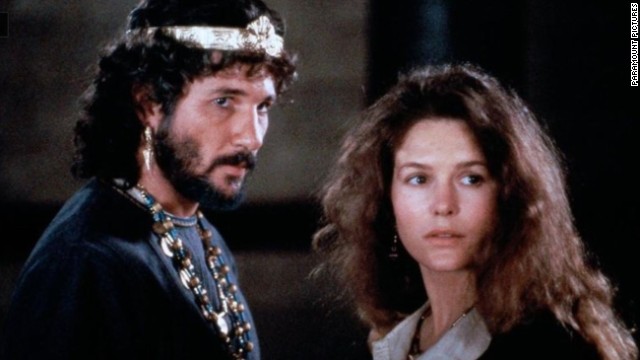 "King David" (1985): From "American Gigolo" to the Bible. This drama follows the life of David and was panned by critics mostly for the casting of Richard Gere in the starring role. Gere was hot off his acclaimed performance in "An Officer and a Gentleman" when he took the role, which marked one of the actor's big early career mishaps.
"King David" (1985): From "American Gigolo" to the Bible. This drama follows the life of David and was panned by critics mostly for the casting of Richard Gere in the starring role. Gere was hot off his acclaimed performance in "An Officer and a Gentleman" when he took the role, which marked one of the actor's big early career mishaps. 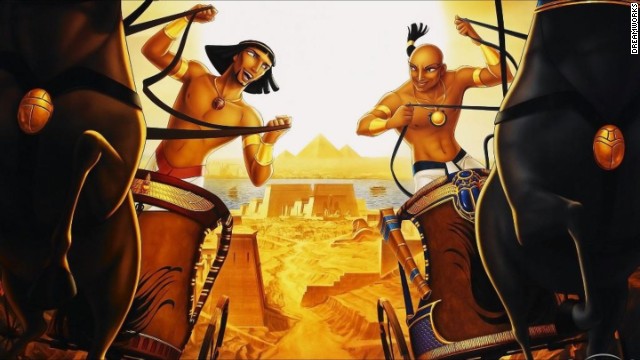 "The Prince of Egypt" (1998): The animated hit grossed more than $200 million worldwide and went on to win an Academy Award, but that didn't come without its share of controversy. The well-received flick was banned in the Maldives and Malaysia, where the population is predominantly Muslim. Moses is considered an Islamic prophet, and the depiction of such figures is forbidden in Islam.
"The Prince of Egypt" (1998): The animated hit grossed more than $200 million worldwide and went on to win an Academy Award, but that didn't come without its share of controversy. The well-received flick was banned in the Maldives and Malaysia, where the population is predominantly Muslim. Moses is considered an Islamic prophet, and the depiction of such figures is forbidden in Islam.
- Darren Aronofsky's "Noah" opens today
- Critics applaud the effort, even if they don't think it entirely works
- One calls the film one of the most ambitious he has seen
(CNN) -- Is it "Titanic" for the faithful?
"Noah," starring Russell Crowe and directed by Darren Aronofsky, opened in theaters today, and the critics have plenty to say about the epic. For the most part, it appears the critics appreciate the efforts of both Crowe and Aronofsky -- who is best known for controversial films such as "Requiem for a Dream" and "Black Swan" -- even if they don't think the pair quite pull it off.
Jordan Hoffman of Screen Crush says, "This film's inscrutable oddness -- and the willingness to take chances -- brought me to a place that could not have predicted. During the film's third act I had no idea how this movie was going to end. Seriously. Even more exciting, once the credits rolled, I had to spend some time to work out how I felt. In fact, I'm still thinking about it."
 Russell Crowe bashes "Noah" critics
Russell Crowe bashes "Noah" critics "Dark" is how Nathan Adams of Film School Rejects describes the big-budget flick. "There's a tension that runs through the whole film about who you should be rooting for, or if it's even possible to root for anyone in this situation," he writes. "Noah goes to such dark places over the course of the movie that it's impossible to keep relating to him as a protagonist (sometimes to the point of comedy, intentional or otherwise), and it becomes necessary for the narrative to switch its viewpoint from character to character."
The headline for Alonso Duralde's review for The Wrap reads, "Darren Aronofsky's biblical 'Waterworld' mostly runs aground." Duralde says that "Unlike the thousands of CGI beasts of the land and air who hitch a ride on 'Noah,' Darren Aronofsky's highly-anticipated epic is neither fish nor fowl; in no way is it a straightforward Bible tale (and given the brevity of Genesis' account of the flood, such a thing would be next to impossible) nor is it the sort of unfettered freak-out that fans of 'Black Swan,' 'Pi' or 'The Fountain' would expect from its director and co-writer (with Ari Handel)."
HitFix's Drew McWeeny writes that "Noah" "is not just one of the most ambitious films I've seen this year, it's one of the most ambitious films I've ever seen. It's a movie that is spilling over with ideas and images and emotional explorations of the metaphysical."
Opinion: Is 'Noah' sacred enough?
Ty Burr of the Boston Globe says the film is "equal parts ridiculous and magnificent." And while noting that Crowe "turns out to be perfectly cast in the title role," Burr writes that "The parts of 'Noah' that don't work really, truly don't. But the parts that do almost sweep you away in the flood."
As the Washington Post notes, the film has had its fair share of controversy, including complaints that there is a lack of mention of God in the film.
Post film critic Ann Hornaday calls it a slightly different take on the biblical story and writes, "The result is a movie that is clearly deeply respectful of its source material but also at times startlingly revisionist, a go-for-broke throwback to Hollywood biblical epics of yore that combines grandeur and grace, as well as a generous dollop of goofy overstatement.
"Viewers may not agree about what they've seen when they come out of 'Noah,' " she said. "But there's no doubt that Aronofsky has made an ambitious, serious, even visionary motion picture, whose super-sized popcorn-movie vernacular may occasionally submerge the story's more reflective implications, but never drowns them entirely."
Likewise, Peter Travers of Rolling Stone cautions, "My advice: Hold off on burning Aronofsky at the stake till you see Noah, a film of grit, grace and visual wonders that for all its tech-head modernity is built on a spiritual core. The Brooklyn-born Aronofsky and his Harvard roomie and writing partner, Ari Handel -- 'two not very religious Jewish guys,' says the director -- are hellbent on making their Noah relevant for believers and skeptics alike."
No comments:
Post a Comment